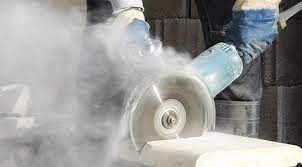
HSE Dust Campaign
HSE’s inspectors across Great Britain will be targeting construction firms to check that their health standards are up to scratch during a month-long inspection initiative, starting on Monday 4th October 2021.
This year’s inspections will focus on respiratory risks and occupational lung disease, looking at the control measures businesses have in place to protect their workers’ lungs from construction dust including silica, asbestos and wood dust. This is part of HSE’s longer term health and work strategy to improve health within the construction industry.
While the primary focus will be on health during this programme of inspections, if an inspector identifies any other areas of concern, including immediate safety risks, they will take the necessary action to deal with them.
Inspectors will be looking for evidence of employers and workers knowing the risks, planning their work and using the right controls. If necessary, they will use enforcement to make sure people are protected.
More than 3,500 builders die each year from cancers related to their work, with thousands more cases of ill-health and working days lost.
HSE’s chief inspector of construction, Sarah Jardine, said: “Around 100 times as many workers die from diseases caused or made worse by their work than are actually killed in construction accidents. There are a few simple things that everyone can do to make sure they are protecting their health and their future. Be aware of the risks associated with activities you do every day, recognise the dangers of hazardous dust and consider how it can affect your health. We want businesses and their workers to think of the job from start to finish and avoid creating dust by working in different ways to keep dust down and wear the right protective equipment.”
What Companies Must Ensure
- Remove the need for cutting where necessary by using alternative tools, i.e. block splitters.
- Ensure that all operatives etc are making use of vacuums for dust extraction when cutting timber / wood-based materials.
- Ensure that all operatives are making use of wet cutting techniques when cutting concrete / stone-based products. This includes using water bottles for dust suppression during cutting and / or wetting down the material surface before cutting.
- Ensure that all operatives exposed to dust, either directly whilst carrying out the works or indirectly when close by, are issued with and are wearing respiratory protection. An FFP3 face mask is to be worn as an absolute minimum.
- Ensure that any residual timber dusts are vacuumed up. Dust must not be allowed to accumulate and must not be swept up as this will result in it becoming airborne and inhalable.
